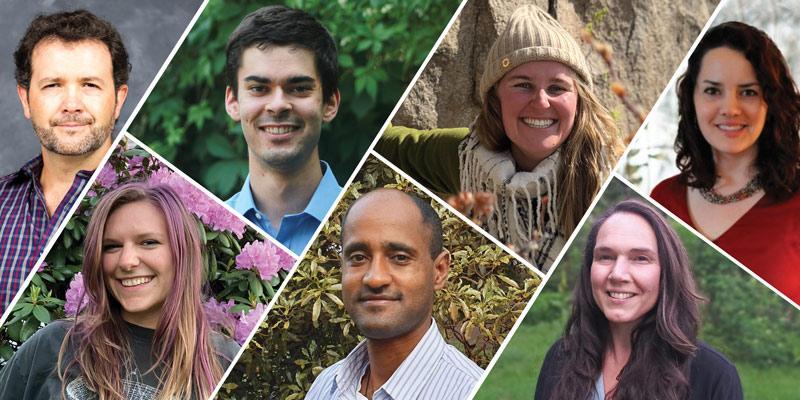The Gund Institute for Environment at UVM today announced support for five outstanding new PhD and postdoctoral fellowship recipients, and two exciting research projects by UVM undergraduate students.
The seven scholars will pursue interdisciplinary research to tackle urgent environmental issues across four themes: climate solutions, sustainable agriculture, health and wellbeing, and resilient communities.
“These are extremely competitive fellowships – and we are excited to welcome this impressive cohort to our global network,” says Ricketts. “Their important work will accelerate research and solutions for urgent environmental issues around the world.”
Gund PhD and Postdoctoral Fellowships are made possible by support from the Gund Family, the Patrick and Marcelle Leahy Scholars Initiative, the Roger and Victoria Sant Trust, the Medina Fund, and a new research partnership with Ben & Jerry’s.
The fellowships include up to four years of funding for doctoral students, and two years of funding for postdoctoral scholars. Gund Undergraduate Research Awards, a partnership with UVM’s Office of Fellowships, Opportunities and Undergraduate Research, includes $5,000 supporting research experience with Gund scholars.
This year’s cohort of Gund fellowship awardees hail from four countries: Chile, Ecuador, Ethiopia, and the U.S.
Gund Postdoctoral Fellowships
Tafesse Kefyalew Estifanos (RSENR) will study how environmentally protected areas impact the transmission of malaria in rural households in developing countries. This research will help inform conservation policy decisions to increase positive public health outcomes. Estifanos will be mentored by Brendan Fisher and Taylor Ricketts.
Working with populations in Ecuador, Peru, and Bolivia, Carlos-Andres Gallegos-Riofrío (RSENR) will study the connections between nature and mental health of indigenous people in the Andes. This research will bring a new understanding to these connections, which are often ignored by existing research that considers industrialized Western societies as the standard for human behavior. Gallegos-Riofrío will be mentored by Rachelle Gould.
Supported by Ben & Jerry’s, Postdoctoral Fellow in Regenerative Agriculture Alissa White (CALS) will work to develop a state-wide farmer research network to collect and share key information that will assist Vermont farmers in making decisions that improve environmental outcomes from their farms. Additionally, the information generated from this project will be used to enhance problem-solving collaboration and track long-term data to further scientific understanding of complex agricultural ecosystem dynamics. White will be mentored by Heather Darby.
Gund PhD Fellowships
Isabella Bennett (RSENR) will build upon previous Gund Institute research to study water quality degradation in Cuba due to agricultural runoff. Through this research, Bennett hopes to improve public health and the health of local ecosystems, as well as facilitate Cuba’s continued adoption of sustainable development strategies. She will be supervised by Paul Bierman.
Amaya Carrasco (Food Systems) will join UVM’s Agroecology and Livelihoods Collaborative (ALC) to work in the Collaborative Crop Research Program’s Agroecology Support Project, which seeks to strengthen agroecological knowledge and capacities in Africa and South America. In collaboration with Ernesto Méndez and Rachelle Gould, Carrasco hopes to focus her work on the Andes region in South America, which includes her home country of Ecuador.
Another PhD Fellowship awardee will start next academic year and be announced at a future date.
Gund Undergraduate Research Awards
Carl Betz (RSENR) will examine how the water treatment residuals, a byproduct of the drinking water treatment process, affect the ability of bioretention rain gardens to remove nitrogen from stormwater runoff. Betz plans to use this research to inform best practices for the management of stormwater to reduce nitrogen pollution. He will be mentored by Stephanie Hurley and Eric Roy.
Alexandra DeFoe (CAS) will study how differences in flower morphology affect virus transmission between bee species. This research will help to guide recommendations for “pollinator-friendly” plantings to reduce viral transmission and improve honeybee colony health. DeFoe will be mentored by Samantha Alger and Alex Burnham.
Since launching three years ago, the Gund Institute for Environment has awarded 21 PhD and postdoctoral fellowships, and 8 undergraduate research awards. Recipients collaborate widely with Gund Fellows from across UVM in a range of disciplines.
With 230 scholars and leaders, the Gund community has more than tripled in size in three years. The Institute’s transdisciplinary network comprises 58 Fellows, 87 Affiliates, 9 Postdoctoral Fellows and 70 Graduate Fellows. These scholars hail from 7 UVM colleges and schools, 31 departments, and 47 external organizations – including Harvard, Stanford, Cambridge, WWF and U.S. Geological Survey – in over 10 countries.
The Gund Institute for Environment catalyzes environmental research, develops real-world solutions to global issues, and connects UVM with leaders in government, business and society. It strives to build a diverse and inclusive community of scholars and leaders, because it is essential to the Institute’s mission and vision for a sustainable world.
Learn more at uvm.edu/gund or follow the Gund Institute on Facebook and Twitter.
